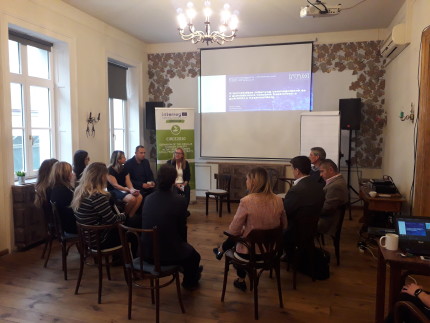Circular Economy Environmental Week
Budapest (HR) 25/29 November
Circular Economy „Environmental week” was organized in Hungary between 25-29 November by IFKA to foster the development of sustainable material- and resource management practices & business models, in order to move forward to circular economy, to facilitate the exploitation of economic benefits and awareness raising among the key stakeholders.
The events and workshops of the Week were closely linked to the environmental goals which have been determined in the SME Strategy for 2019-2030 by Ministry for Innovation and Technology (MIT), such as promoting the material and resource-efficient operation of companies by supporting their green and high-tech reformation. During the week, in collaboration of the participating relevant organizations - such as Ministry for Innovation and Technology; National Research, Development and Innovation Office; Association of Environmental Enterprises; Hungarian Waste Management Federation, companies, universities - the current situation, challenges and benefits of circular economy, as well as the related solutions and strategic opportunities have been analysed.
As a preliminary event for the week on 18th-19th November an LCA conference was organised by the Bay Zoltán Foundation for Applied Research with the title “Circular solutions – challenges in life cycle management.
The Week itself began with a roundtable discussion on “How to move forward with the circular economy” where the main focus areas – which are significant to foster the practical implementation – have been identified during the peer learning with the invited experts (representatives of ministries, environmental associations, waste experts and universities). These included the assessment of current situation, determination of the regulatory environment and other economic incentives, coordination of related project and results (the need of a common platform), awareness raising and development of a comprehensive communication strategy to achieve these objectives. The aforementioned areas were also in focus and discussed at the other events.
Parallel to this, a Green Public Procurement event was organized with 39 participants where there was a clear demand both the companies and the market for economically beneficial technologies, products and services.
On Tuesday, material recycling opportunities and handling challenges of the two selected waste streams from the Hungarian pilot area – plastic composite and rubber residues from tire production – were discussed during a By-forum with involved waste experts. In addition, the newest issues related to the product fee regulation were introduced by the representative of the relevant ministry.

The next event focused on sharing the results and findings of EU funded and Hungarian circular economy projects and identifying synergies (like MOVECO, TRIS). It has become clear that sharing knowledge, exchanging experiences and collaboration through regular organized forums and meetings are essential. These can multiply the impact of the results achieved. In addition, definitions need to be standardized so that everyone can speak the same language and it helps to move forward to practical implementation.
The Thursday’s event took place in the Hungarian pilot area - Tatabánya Industrial Park - where the participants got to know more about the transportation route of the collected waste, the landfill and the treatment process of the separately collected and mixed waste could be examined. After that a workshop was held to introduce the results of CIRCE2020 project and the pilot actions.
The last event was about the communication of circular economy and the related business models with involved communication experts. We looked at how we can reach the SMEs and prove to them that the transition to circular economy is not only about environmental protection, but it also has economic benefits. According to the discussion with experts the main statement was that we need to share the Hungarian good practices as widely as possible which can be achieved through collaboration.
The Week itself was a great success in Hungary. We managed to get on board relevant stakeholders with whom we could get an impact on the transition to a circular economy.
